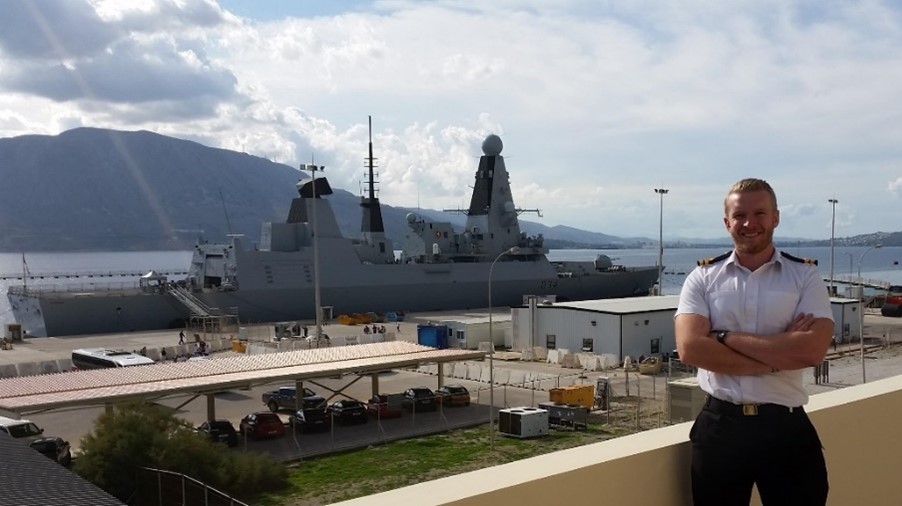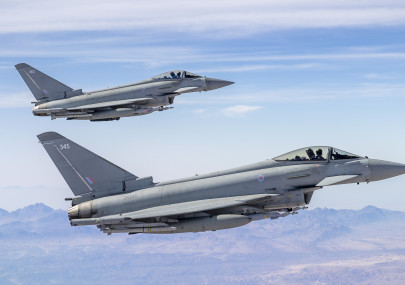We recently welcomed Josh to our Maritime Division as our first marine engineer. He joined us following a nine-year career in the Royal Navy (RN) serving in a broad range of ships including the Queen Elizabeth Class aircraft carrier, a Type 45 destroyer, a Type 23 frigate, and the helicopter carrier HMS Ocean - as well as a stint managing engineering training delivery at HMS SULTAN.
Now that he’s fully settled into life at Inzpire, we caught up with him again to find out more about his transition from the RN to a civilian role, and what he’s enjoying most about his new job.
Firstly, can you tell us a little bit about your engineering background and what led you to join the RN?
My interest in engineering started at school. I was naturally quite good at maths, physics, and technology subjects (despite being quite lazy!) which led me to enjoy those classes and set me up for further education in engineering.
I knew that I wanted to be an engineer in some form, but I had no idea what I was going to do during school, sixth form or even university. I studied mechanical engineering at Queen Mary University of London, and it was during my last six months there that I found out about careers in the RN and decided that would be a great option for me (a £27,000 joining bonus may have helped sway my decision). I booked myself an appointment at the nearest Armed Forces Careers Office and here I am, almost 10 years later!

A young Midshipman Hind (left) passing out of Britannia Royal Naval College
What was it like being in the Royal Navy?
The Navy gave me the opportunity to experience some amazing things. I struggle to believe that many civilian roles would offer the same amount of variation within one organisation.
The training and career structure make it an excellent first career for a lot of people, especially if, like me, you aren’t sure exactly what you want to do. I learnt more about engineering and management in my first few years in the RN than I did during the previous 16 years of formal education. That level of training doesn’t come without some incredibly hard work and rising to challenges along the way – whether that be taking a dip in a frosty river during initial training or working around the clock to get a ship safely to sea on time.

HMS Queen Elizabeth’s Marine Engineering Department whilst deployed to the USA on WESTLANT 19
One of my proudest moments was passing the Marine Charge Qualification. This is an examination taken at the end of my first role at sea and, for me, was the culmination of five years of training. I just remember how much work I put in to meet the standard, and when I achieved it, I was so confident in running my own department. The head of the engineering department was able to leave me in charge and take the £1 billion warship to sea – it was such a good feeling.
Another career highlight for me was being one of the lead engineers that took HMS QUEEN ELIZABETH in for her first ever docking period. It was an amazing experience; planning and executing the docking down of a 65,000-ton, £3 billion aircraft carrier; followed by a seven-week maintenance package before flooding her back up again and returning to sea! This docking period was a crucial step in getting the ship ready for her seven-month maiden global deployment leading Carrier Strike Group 21 (CSG21).

HMS Queen Elizbeth’s Marine Engineering Department during her first docking period
I was also an engineer on a Type 45 destroyer. You may have heard some of the issues with the T45 power and propulsion system - and being at sea on a platform that is prone to electrical failures does not always make for comfortable living. During my time serving in a T45, I was involved with a number of trials for the Power Improvement Project (PIP) which aims to significantly improve the resilience of the class. My friends who are still serving inform me that the upgrade has been a great success and the engineers now have a lot more confidence in the reliability of the plant – a massive win for the RN – and something I’m proud to have been a part of.

HMS Diamond alongside in Souda Bay for a maintenance and logistics stop
Why did you then choose to work for Inzpire?
As my family circumstances changed - I have a fiancé and young twin daughters - the idea of deployments around the world with long periods of separation became less appealing. A couple of friends had already transitioned from the armed forces to Inzpire and they told me how great the company was from inside the wire. I still had a passion for the Navy and marine engineering, so I wanted to stay within the industry. Inzpire had a newly formed Maritime Division, who were looking to expand their team and their experience base – so I jumped at the chance!

Josh with his twin daughters, Alexandra (left) and Charlotte (right)
How are you finding your new role at Inzpire?
So far, it has been fantastic! The civilian world is very different to a military career, but around 80% of Inzpire’s employees come from a military background, so everyone understands the process and they have been really supportive throughout my transition.
As well as project delivery, I get to be involved throughout the whole business winning process which has rapidly increased my commercial understanding (often a weak point for service leavers). I am involved from the initial stages of business development and managing customer relationships, right through to opportunity proposals, finance, legal, and delivery.
It is really satisfying to help a customer from the initial stages of defining their requirement, through to delivering the end service. I was amazed at how many different mechanisms there are for helping a customer onto contract. As part of QinetiQ and one of the three prime contractors forming the Aurora Partnership, I have found that the Engineering Delivery Partnership process can help ensure a win-win for the MOD and industry. You can read more on the routes to market available here.
What are your top tips for transitioning from the RN to a civilian job?
Networking – it can be too early to apply for jobs, but it is never too early to start networking. You will be amazed at how far people will go to help military personnel transition to civilian life, especially people who have already done it. Everyone takes a slightly different path when they leave, and the more people you speak to, the better you’ll be able to carve out your own path.
Experience – people in the RN (and other military arms) have an incredible breadth of experience, significantly more than your average job seeker. The problem is that a lot of service leavers don’t know how to make the connection between their past experience and the requirements of a civilian role. Take your time reading a job description and really dig deep into your experience and connect the dots. Some people have led a team into a smoke-filled engine room in full firefighting rig but would struggle to answer the questions “Tell me about a time when you led a team in challenging circumstances”.
Also, in my experience, most potential employers place a higher weighting on your experience than your qualifications. A lot of service leavers spend their last 12 months trying to cram in all sorts of project management courses (myself included), but most interviewers will ask “Tell me about a time when you managed a complicated project” before they ask, “What qualifications have you got?”.

Enjoying the weather by the sea in Portsmouth
Find out more about our Maritime Division or visit our careers page to learn about the varied and rewarding opportunities at Inzpire.
